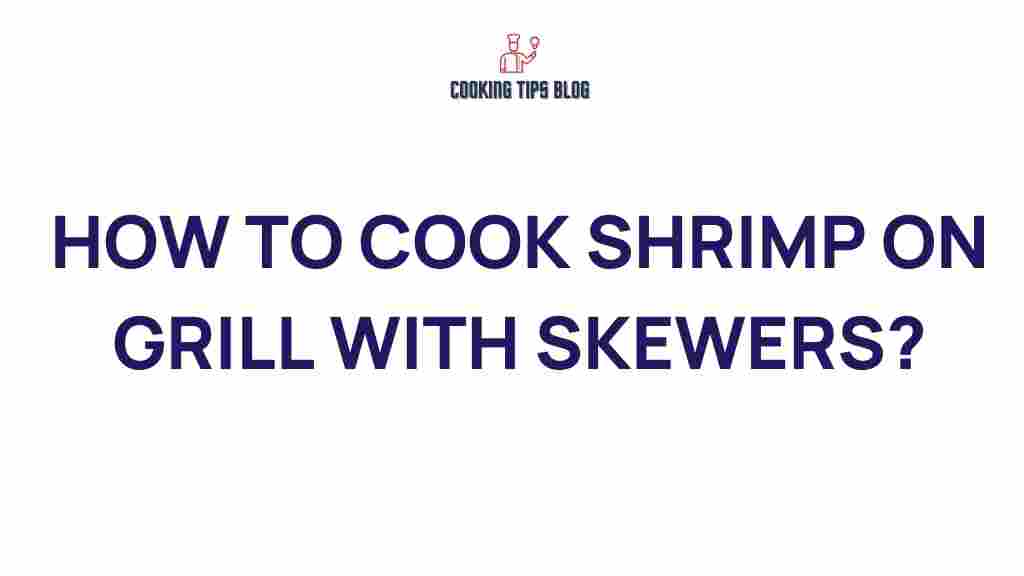Grilling Shrimp: A Guide to Perfectly Skewered Seafood
Grilling shrimp is one of the simplest and most delightful ways to savor the incredible flavors of seafood. With a few essential ingredients and techniques, you can transform ordinary shrimp into a mouthwatering dish that will impress your family and friends. Whether you’re hosting a summer barbecue or enjoying a cozy dinner at home, mastering the art of grilling shrimp can elevate your culinary skills. In this article, we will explore the basics of grilling shrimp, share some delicious marinade recipes, and provide tips to troubleshoot common issues. Let’s dive into the world of skewered seafood!
Why Choose Shrimp for Grilling?
Grilling shrimp is not only a quick cooking method but also a healthy choice. Shrimp is low in calories and high in protein, making it an excellent addition to any meal. Here are a few reasons why shrimp is perfect for grilling:
- Quick Cooking Time: Shrimp cooks quickly, usually in just 2-3 minutes per side.
- Versatile Flavor: Shrimp can absorb various marinades and spices, allowing you to customize flavors.
- Low in Fat: Grilled shrimp is a lean protein that fits into many dietary preferences.
Choosing the Right Shrimp
When it comes to grilling shrimp, the quality and type of shrimp you choose are crucial. Here are some tips for selecting the best shrimp:
- Fresh or Frozen: Fresh shrimp is ideal, but frozen shrimp is a great option. Ensure that it’s properly thawed before grilling.
- Size Matters: Medium to large shrimp (16/20 count) is perfect for skewering and grilling.
- Shell-On or Peeled: You can grill shrimp with the shell on for added flavor, but peeled shrimp are easier to eat.
Step-by-Step Process for Grilling Shrimp
Ingredients for Grilling Shrimp
Here’s what you’ll need to get started with grilling shrimp:
- 1 pound of shrimp (peeled and deveined)
- Your choice of marinade (see recipes below)
- Skewers (wooden or metal)
- Olive oil for grilling
- Salt and pepper to taste
Marinade Recipes
The marinade is key to infusing shrimp with flavor. Here are a few easy and delicious marinade recipes:
- Citrus Marinade: Mix 1/4 cup olive oil, juice of 1 lemon, juice of 1 lime, 2 cloves minced garlic, salt, and pepper.
- Spicy Marinade: Combine 1/4 cup olive oil, 2 tablespoons sriracha sauce, 1 tablespoon honey, and 1 teaspoon smoked paprika.
- Herb Marinade: Blend 1/4 cup olive oil, 1 tablespoon chopped fresh parsley, 1 tablespoon chopped fresh cilantro, 1 tablespoon lemon juice, salt, and pepper.
Preparation Steps
Now that you have your shrimp and marinade ready, follow these simple steps to prepare for grilling:
- Marinate the Shrimp: Place shrimp in a bowl or zip-top bag and pour your chosen marinade over them. Allow the shrimp to marinate for at least 30 minutes (or up to 2 hours in the refrigerator).
- Prepare the Skewers: If using wooden skewers, soak them in water for 30 minutes to prevent burning. Metal skewers do not require soaking.
- Skewer the Shrimp: Thread shrimp onto skewers, leaving a little space between each piece to ensure even cooking.
Grilling Shrimp
Once your shrimp are marinated and skewered, it’s time to grill!
- Preheat the Grill: Heat your grill to medium-high heat (about 375°F to 400°F).
- Oil the Grill Grates: Lightly brush the grill grates with olive oil to prevent sticking.
- Place the Skewers on the Grill: Grill the shrimp for about 2-3 minutes on each side, until they turn pink and opaque.
- Check for Doneness: Shrimp are done when they curl into a C shape and have a firm texture.
Serving Suggestions
Grilled shrimp can be served in various ways:
- Serve on a bed of rice or quinoa for a complete meal.
- Top salads with grilled shrimp for added protein.
- Pair with grilled vegetables or a fresh salsa for a refreshing side.
Troubleshooting Common Issues
Even the most experienced cooks face challenges when grilling shrimp. Here are some common issues and how to troubleshoot them:
Shrimp Sticking to the Grill
If your shrimp are sticking to the grill grates, make sure to preheat the grill adequately and oil the grates before cooking. Additionally, ensure that the shrimp are not overcrowded on the skewers, which can trap moisture and cause sticking.
Shrimp Overcooking
Overcooked shrimp can become rubbery and tough. To prevent this, keep a close eye on your shrimp while grilling. As soon as they turn pink and opaque, remove them from the grill. The cooking process is quick, so timing is crucial!
Uneven Cooking
If some shrimp are undercooked while others are overcooked, try to choose shrimp that are uniform in size. This ensures even cooking. Also, avoid overcrowding the grill, as this can trap heat and cause uneven temperatures.
Conclusion
Grilling shrimp is a delightful culinary endeavor that can yield impressive results. With the right marinade, proper techniques, and a little practice, you can master the art of grilling shrimp and enjoy a flavorful and healthy dish that everyone will love. Don’t forget to experiment with different marinades and accompaniments to find your perfect combination!
For more grilling tips and recipes, check out our grilling guide. And remember, whether you’re grilling shrimp for a casual weekday dinner or a festive gathering, the most important ingredient is the love you put into your cooking!
Happy grilling!
This article is in the category Recipes and created by Cookingtipsblog Team
